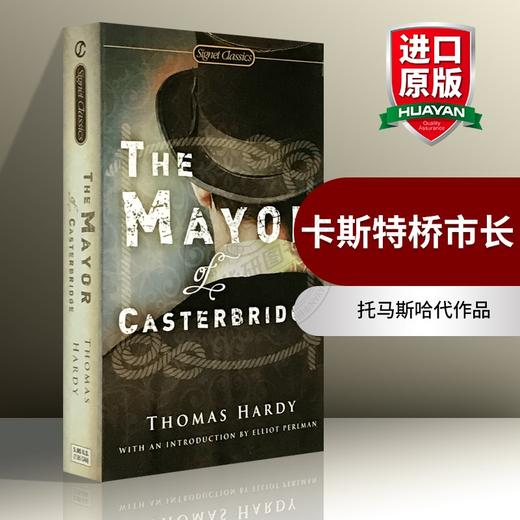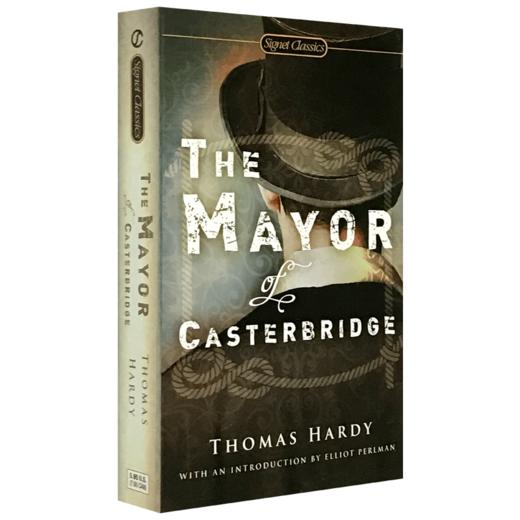卡斯特桥市长 英文原版小说 The Mayor of Casterbridge 正版进口书籍 全英文版书
| 运费: | ¥ 0.00-999.00 |
| 库存: | 30 件 |
商品详情
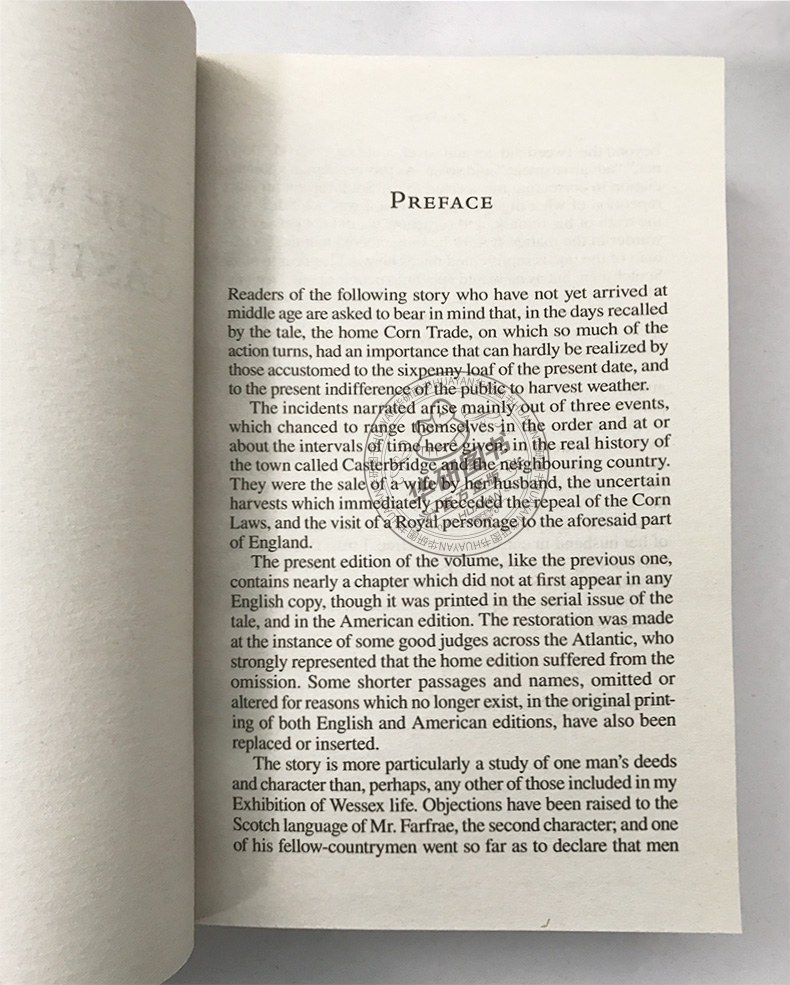
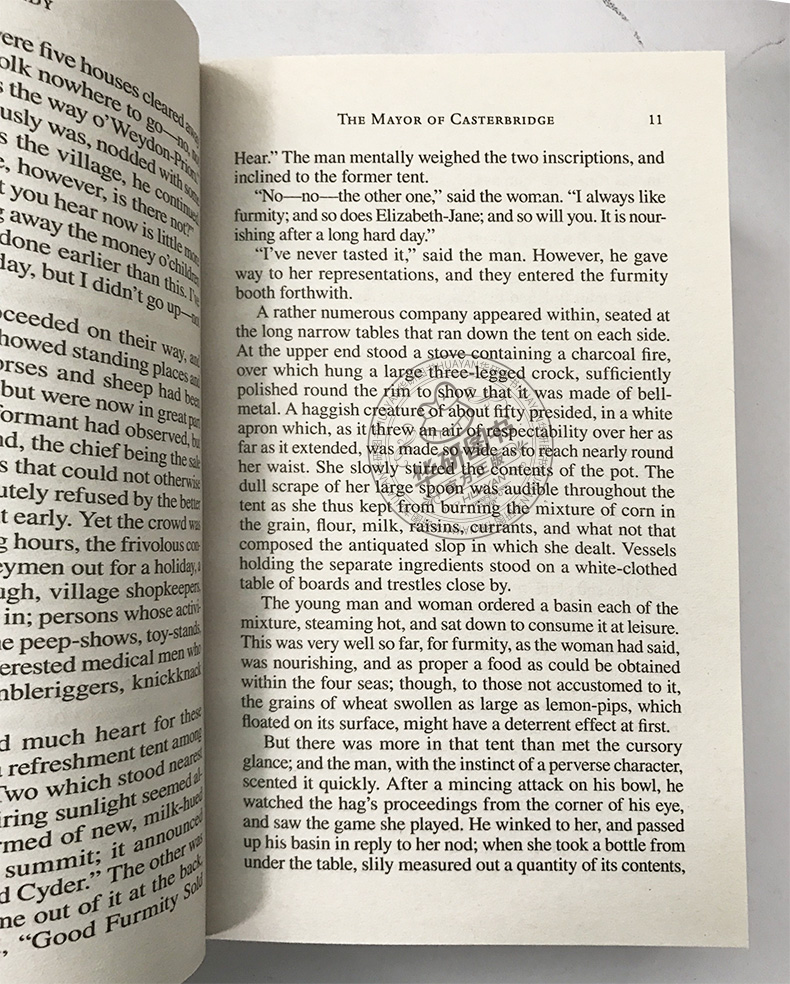
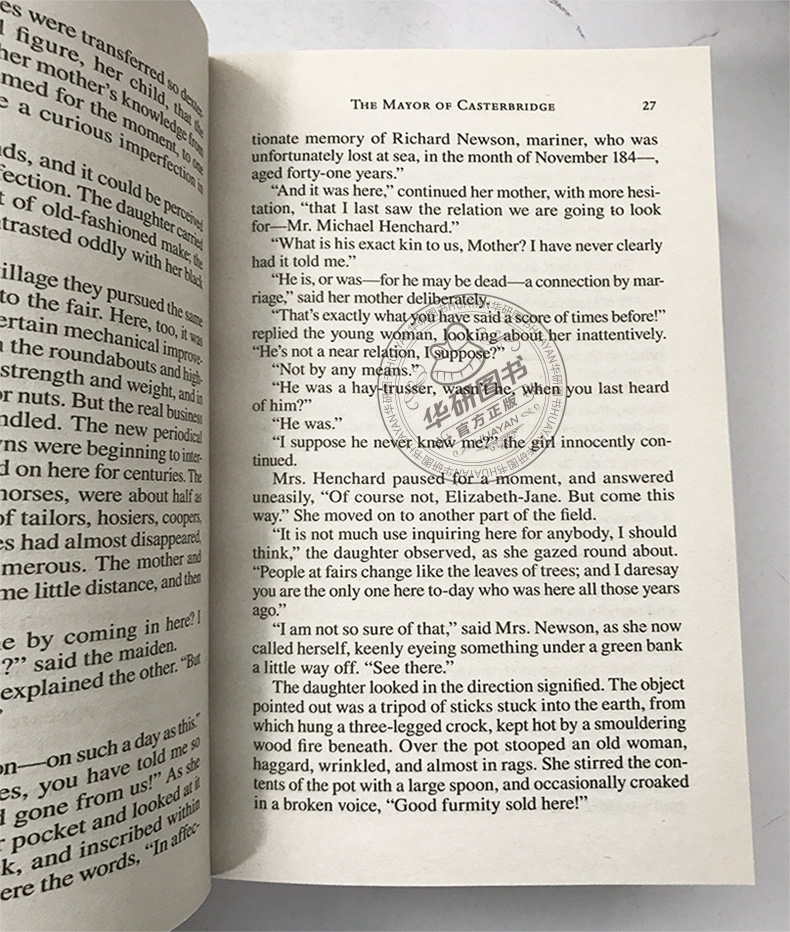
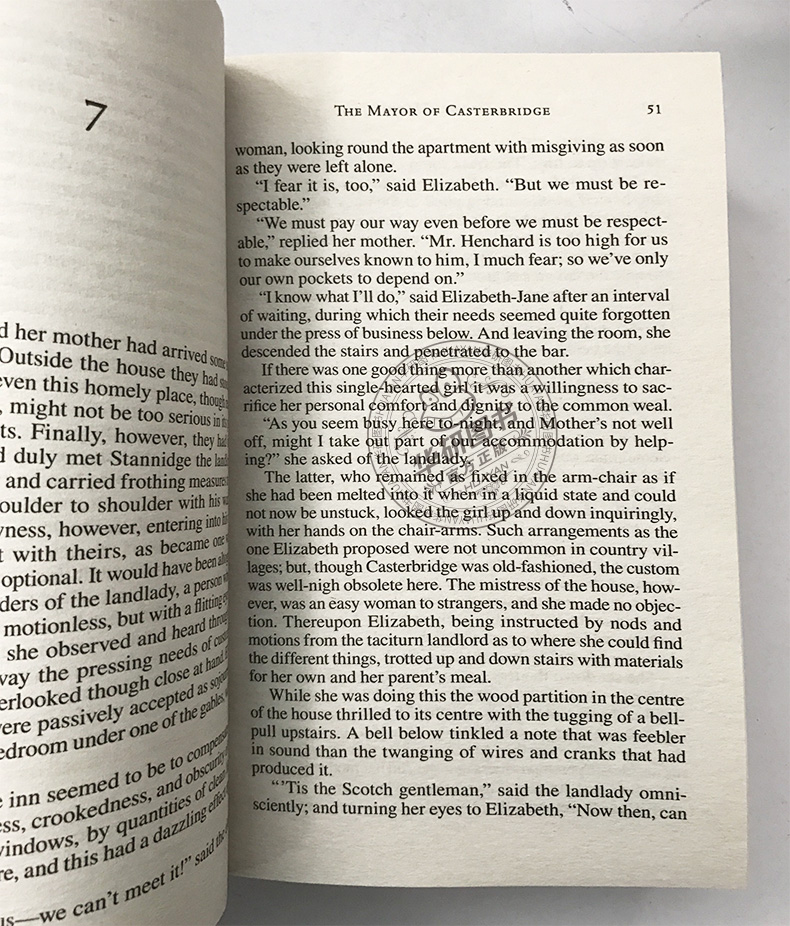

书名:The Mayor of Casterbridge 卡斯特桥市长
难度:Lexile蓝思阅读指数1090L
作者:Thomas Hardy托马斯•哈代
出版社名称:Signet Classics
出版时间:2008
语种:英文
ISBN:9780451530929
商品尺寸:10.6x2.6x 17.3cm
包装:简装
页数:400 (以实物为准)
The Mayor of Casterbridge《卡斯特桥市长》是英国知名小说家、诗人哈代的威塞克斯小说体系中的一部重要之作。作品中融入了希腊酒神原型,以及俄狄浦斯王悲剧模式。与维多利亚时期同类作品相比,《卡斯特桥市长》不再拘于传统小说的善与恶的主题,而是努力探索人物形象、人格的双重性与复杂性。在哈代的十四部长篇小说中,《卡斯特桥市长》既体现了哈代创作一贯的风格,又独创了别具一格的艺术特色,由此也显现了一位大艺术家与平庸的多产作家本质的不同。至于这部小说的内容,不论是在历史的和现实的社会认知方面,它至今都有鲜活的意义。
本书为Signet Classics推出的英文原版,由Elliot Perlman作序,内容完整无删节,体积小巧,方便随身携带。
“Hardy’s world is a world that can never disappear.” —Margaret Drabble
From its spectacular opening—the astonishing scene in which drunken Michael Henchard sells his wife and daughter to a passing sailor at a county fair—to the breathtaking series of discoveries at its conclusion,The Mayor of Casterbridgeclaims a unique place among Thomas Hardy’s finest and most powerful novels.
Rooted in an actual case of wife-selling in early nineteenth-century England, the story build into an awesome Sophoclean drama of guilt and revenge, in which the strong, willful Henchard rises to a position of wealth and power—only to suffer a most bitter downfall. Proud, obsessed, ultimately committed to his own destruction, Henchard is, as Albert Guerard has said, “Hardy’s Lord Jim…his only tragic hero and one of the greatest tragic heroes in all fiction.”
With an Introduction by Elliot Perlman

The Mayor of Casterbridge《卡斯特桥市长》讲述了主人公亨察尔原是个打草工,因醉酒将妻女出卖。事后追悔莫及,从此滴酒不沾,发奋致富,二十年后当上了卡斯特桥市长,后来妻女回到了他的身边,但灾难也接踵而至。由于他的刚愎、偏执,与原来的合伙人闹翻,并在竞争中陷于破产,当年出卖妻女的丑闻也张扬出去以至身败名裂,众叛亲离,在一所小屋里凄惨地死去。作者通过这一悲剧性的描写,揭示了资本主义发展给劳动人民带来的灾难,谴责资本主义制度的不合理性。
One of Hardy’s most powerful novels,The Mayor of Casterbridgeopens with a shocking and haunting scene: In a drunken rage, Michael Henchard sells his wife and daughter to a visiting sailor at a local fair. When they return to Casterbridge some nineteen years later, Henchard—having gained power and success as the mayor—finds he cannot erase the past or the guilt that consumes him.The Mayor of Casterbridgeis a rich, psychological novel about a man whose own flaws combine with fate to cause his ruin.

托马斯•哈代(Thomas Hardy,1840~1928),英国作家。做过建筑师助手,19世纪60年代转向文学活动。一生写有许多作品,前期作品长篇小说《绿荫下》《远离尘嚣》,将宗法制农村生活理想化,反对资本主义的城市文明。长篇小说《还乡》《卡斯特桥市长》《林中居民》《德伯家的苔丝》和《无名的裘德》。
Thomas Hardywas born on June 2, 1840. In his writing, he immortalized the site of his birth—Egdon Heath, in Dorset, near Dorchester. Delicate as a child, he was taught at home by his mother before he attended grammar school. At sixteen, Hardy was apprenticed to an architect, and for many years, architecture was his profession; in his spare time, he pursued his first and last literary love, poetry. Finally convinced that he could earn his living as an author, he retired from architecture, married, and devoted himself to writing. An extremely productive novelist, Hardy published an important book every year or two. In 1896, disturbed by the public outcry over the unconventional subjects of his two greatest novels—Tess of the D’UrbervillesandJude the Obscure—he announced that he was giving up fiction and afterward produced only poetry. In later years, he received many honors. He died on January 11, 1928, and was buried in Poet’s Corner, in Westminster Abbey. It was as a poet that he wished to be remembered, but today critics regard his novels as his most memorable contribution to English literature for their psychological insight, decisive delineation of character, and profound presentation of tragedy.

One evening of late summer, before the nineteenth century had reached one-third of its span, a young man and woman, the latter carrying a child, were approaching the large village of Weydon-Priors, in Upper Wessex, on foot. They were plainly but not ill clad, though the thick hoar of dust which had accumulated on their shoes and garments from an obviously long journey lent a disadvantageous shabbiness to their appearance just now.
The man was of fine figure, swarthy, and stern in aspect; and he showed in profile a facial angle so slightly inclined as to be almost perpendicular. He wore a short jacket of brown corduroy, newer than the remainder of his suit, which was a fustian waistcoat with white horn buttons, breeches of the same, tanned leggings, and a straw hat overlaid with black glazed canvas. At his back he carried by a looped strap a rush basket, from which protruded at one end the crutch of a hay-knife, a wimble for hay-bonds being also visible in the aperture. His measured, springless walk was the walk of the skilled countryman as distinct from the desultory shamble of the general labourer; while in the turn and plant of each foot there was, further, a dogged and cynical indifference personal to himself, showing its presence even in the regularly interchanging fustian folds, now in the left leg, now in the right, as he paced along.
What was really peculiar, however, in this couple’s progress, and would have attracted the attention of any casual observer otherwise disposed to overlook them, was the perfect silence they preserved. They walked side by side in such a way as to suggest afar off the low, easy, confidential chat of people full of reciprocity; but on closer view it could be discerned that the man was reading, or pretending to read, a ballad sheet which he kept before his eyes with some difficulty by the hand that was passed through the basket strap. Whether this apparent cause were the real cause, or whether it were an assumed one to escape an intercourse that would have been irksome to him, nobody but himself could have said precisely; but his taciturnity was unbroken, and the woman enjoyed no society whatever from his presence. Virtually she walked the highway alone, save for the child she bore. Sometimes the man’s bent elbow almost touched her shoulder, for she kept as close to his side as was possible without actual contact; but she seemed to have no idea of taking his arm, nor he of offering it; and far from exhibiting surprise at his ignoring silence she appeared to receive it as a natural thing. If any word at all were uttered by the little group, it was an occasional whisper of the woman to the child—a tiny girl in short clothes and blue boots of knitted yarn—and the murmured babble of the child in reply.
The chief—almost the only—attraction of the young woman’s face was its mobility. When she looked down sideways to the girl she became pretty, and even handsome, particularly that in the action her features caught slantwise the rays of the strongly coloured sun, which made transparencies of her eyelids and nostrils and set fire on her lips. When she plodded on in the shade of the hedge, silently thinking, she had the hard, half-apathetic expression of one who deems anything possible at the hands of Time and Chance except, perhaps, fair play. The first phase was the work of Nature, the second probably of civilization.
That the man and woman were husband and wife, and the parents of the girl in arms, there could be little doubt. No other than such relationship would have accounted for the atmosphere of stale familiarity which the trio carried along with them like a nimbus as they moved down the road.
The wife mostly kept her eyes fixed ahead, though with little interest—the scene for that matter being one that might have been matched at almost any spot in any county in England at this time of the year; a road neither straight nor crooked, neither level nor hilly, bordered by hedges, trees, and other vegetation, which had entered the blackened-green stage of colour that the doomed leaves pass through on their way to dingy, and yellow, and red. The grassy margin of the bank, and the nearest hedgerow boughs, were powdered by the dust that had been stirred over them by hasty vehicles, the same dust as it lay on the road deadening their footfalls like a carpet; and this, with the aforesaid total absence of conversation, allowed every extraneous sound to be heard.
For a long time there was none, beyond the voice of a weak bird singing a trite old evening song that might doubtless have been heard on the hill at the same hour, and with the self-same trills, quavers, and breves, at any sunset of that season for centuries untold. But as they approached the village sundry distant shouts and rattles reached their ears from some elevated spot in that direction, as yet screened from view by foliage. When the outlying houses of Weydon-Priors could just be descried, the family group was met by a turnip-hoer with his hoe on his shoulder, and his dinner-bag suspended from it. The reader promptly glanced up.
“Any trade doing here?” he asked phlegmatically, designating the village in his van by a wave of the broadsheet. And thinking the labourer did not understand him, he added, “Anything in the hay-trussing5 line?”
The turnip-hoer had already begun shaking his head. “Why, save the man, what wisdom’s in him that ’a should come to Weydon for a job of that sort this time o’ year?”
“Then is there any house to let—a little small new cottage just a builded, or such like?” asked the other.
The pessimist still maintained a negative. “Pulling down is more the nater of Weydon. There were five houses cleared away last year, and three this; and the volk nowhere to go—no, not so much as a thatched hurdle that’s the way o’ Weydon-Priors.”
The hay-trusser, which he obviously was, nodded with some superciliousness. Looking towards the village, he continued, “There is something going on here, however, is there not?”
“Ay. ’Tis Fair Day. Though what you hear now is little more than the clatter and scurry of getting away the money o’ children and fools, for the real business is done earlier than this. I’ve been working within sound o’t all day, but I didn’t go up—not I. ’Twas no business of mine.” The trusser and his family proceeded on their way, and soon entered the Fair-field, which showed standing-places and pens where many hundreds of horses and sheep had been exhibited and sold in the forenoon, but were now in great part taken away. At present, as their informant had observed, but little real business remained on hand, the chief being the sale by auction of a few inferior animals, that could not otherwise be disposed of, and had been absolutely refused by the better class of traders, who came and went early. Yet the crowd was denser now than during the morning hours, the frivolous contingent of visitors, including journeymen out for a holiday, a stray soldier or two come on furlough, village shopkeepers, and the like, having latterly flocked in; persons whose activities found a congenial field among the peep-shows, toy-stands, waxworks, inspired monsters, disinterested medical men who travelled for the public good, thimble-riggers,nick-nack vendors, and readers of Fate.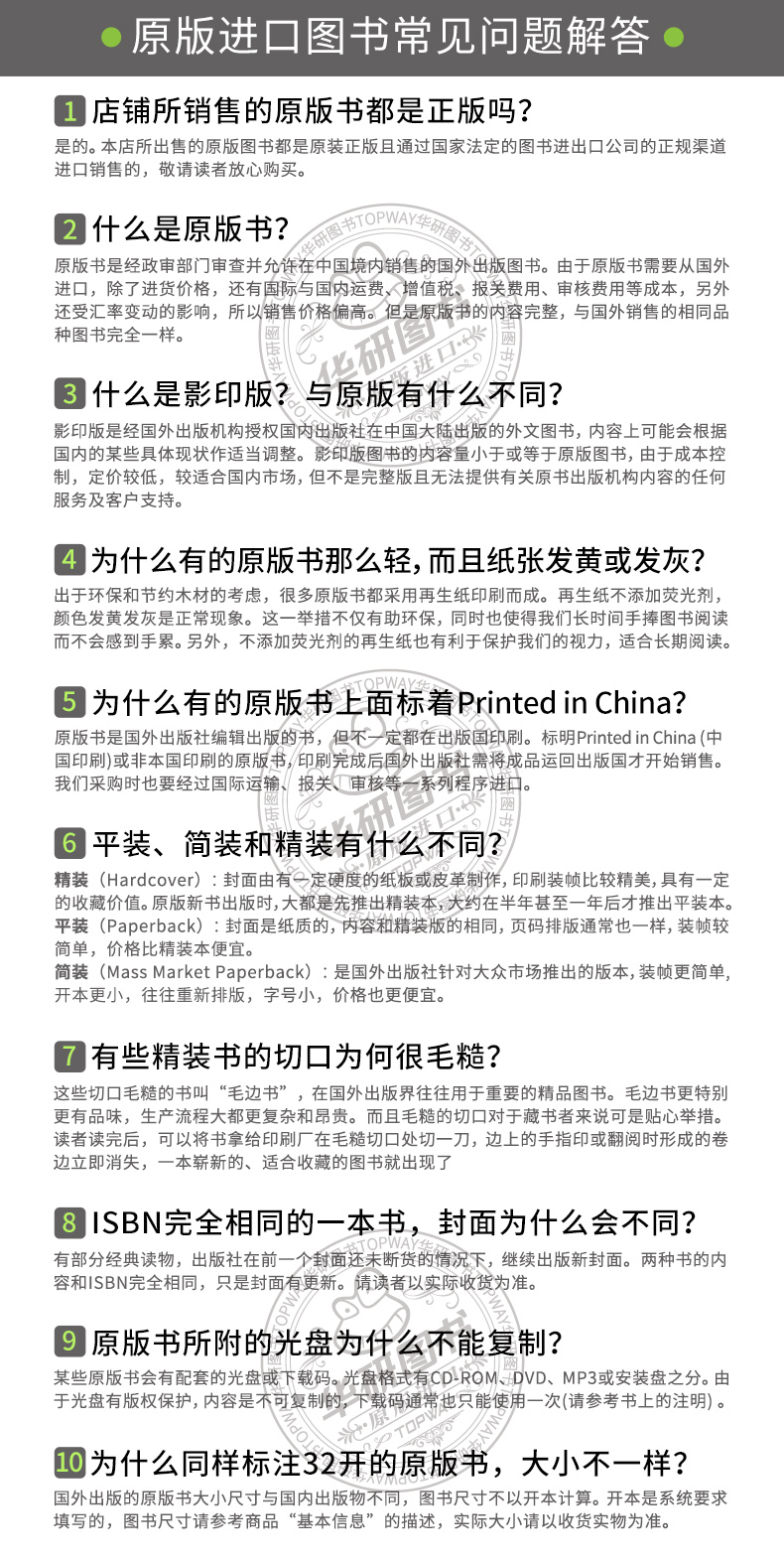
- 华研外语 (微信公众号认证)
- 本店是“华研外语”品牌商自营店,全国所有“华研外语”、“华研教育”品牌图书都是我司出版发行的,本店为华研官方源头出货,所有图书均为正规正版,拥有实惠与正版的保障!!!
- 扫描二维码,访问我们的微信店铺
- 随时随地的购物、客服咨询、查询订单和物流...
